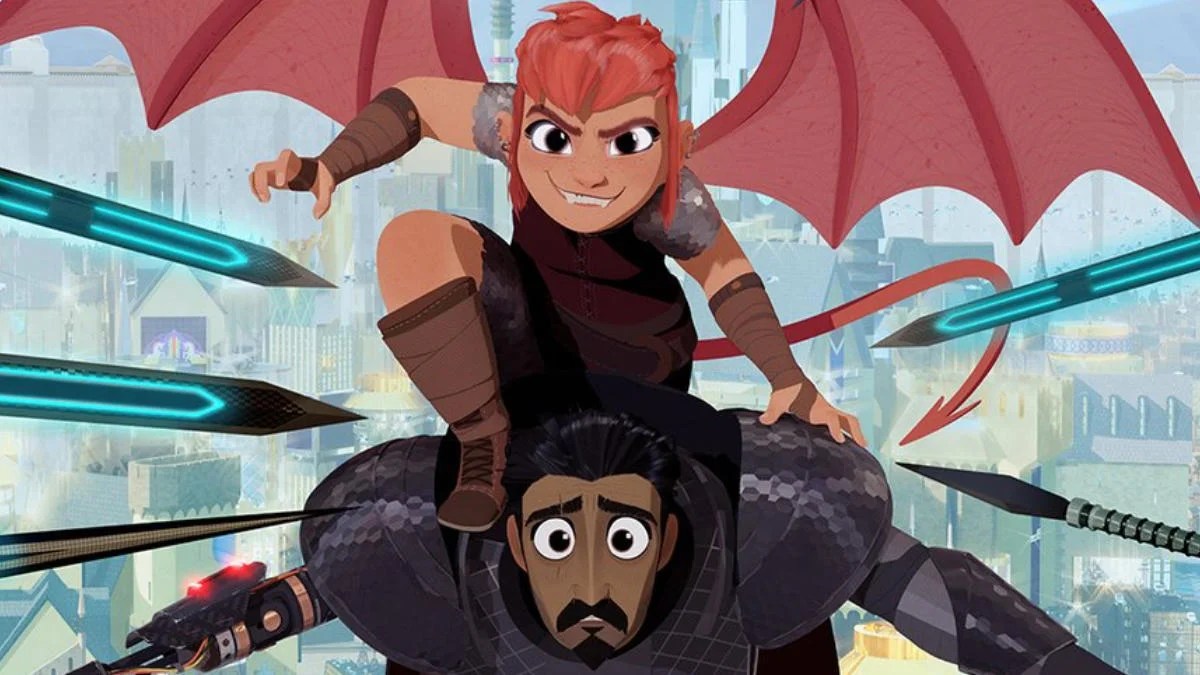If You Take Only One Lesson From ‘Nimona,’ Make It This One

Nimona, the Netflix adaptation of N.D. Stevenson’s beloved graphic novel, is a hit—and it’s the story of queerness and acceptance that we all need right now. In particular, the third act gets to the heart of why Nimona herself is in so much pain, and the heartbreaking reason why she never had to become a villain in the first place.
Let’s break down the ending of Nimona, and dig into what makes it such a powerful metaphor for the bigotry that’s flourishing all around us right now.
What happens at the end of Nimona?
Nimona tells the story of a shapeshifter who latches onto the disgraced knight Ballister Boldheart. Ballister is on the run after being framed for the murder of the queen, and Nimona seeks him out to become his sidekick.
However, once Nimona and Ballister figure out that it was the Director of the Institute for Elite Knights who framed Ballister, they set out to prove his innocence. The Institute has traditionally been made up of direct descendants of Gloreth, founder of the kingdom, but Ballister earned the Director’s ire after becoming the first commoner to gain admission.
The Director discovers that Nimona is the same monster that Gloreth defeated a thousand years ago. This information makes its way to Ballister, who loses his trust in Nimona. Nimona flees, coming upon an abandoned well.
This is where the movie takes a particularly heartbreaking turn. All her life, Nimona has been spurned, feared, and called a monster because of her shapeshifting abilities. However, standing at the well, she remembers a long-ago friendship she forged with a human girl. In Nimona’s flashback, we see her reveal her abilities to her new friend, who accepts her. For the first time in her life, Nimona forms a connection with someone who doesn’t mind that she’s different.
But when the girl’s village finds out, they turn on her. Nimona panics and accidentally starts a fire, and we find out that the girl she befriended is none other than Gloreth. Gloreth turns on Nimona, banishing her with the tip of her sword.
Driven wild with grief and anger at the memory—and at Ballister’s betrayal—Nimona becomes the giant black monster of legend. She rampages through the city, and the Director orders her knights to fire on Nimona with a cannon, even though countless civilians will be caught in the line of fire.
Nimona, believing that she’ll always be seen as a monster, goes to a statue of Gloreth holding out her sword. Just as she’s about to impale herself, though, Ballister stops her. “I’m sorry,” he says. “I see you, Nimona, and you’re not alone.” Nimona falls into his arms.
The Director still plans to fire the cannon, though, and Nimona takes it upon herself to stop her. She blocks the cannon with her own body, exploding into a shower of pink sparks as she destroys it.
Does Nimona survive?
At first, it looks like Nimona has sacrificed herself to save the city. In doing so, she earns a hero’s reputation, as Ballister’s name is cleared and the city celebrates both of them. Ballister even gets back together with his lover Ambrosius, who turned against him after he was framed.
Ballister goes back to their hideout, where he mourns Nimona privately. Suddenly, though, he sees a pink glow, and his face lights up as he realizes Nimona is still alive. “Hey, boss,” Nimona says.
Nimona’s climactic scene is an allegory everyone needs to see
All through the movie, there’s one significant bit of information that’s left out. Why exactly do Nimona’s powers make her a such a threat?
The answer, in short, is that they don’t. Gloreth’s abandonment, the kingdom’s fear and disgust—there’s no reason for any of it. Nimona is a beautiful, miraculous being, but everyone she encounters lets their fear and ignorance dictate how they see her. There’s no logic behind their hatred. There’s only cold, ugly bigotry.
This aspect of the movie is especially apparent in one of the Director’s final lines, when she says that Nimona must be destroyed because she threatens the kingdom’s “way of life.” Like Ballister, whose background threatens the supremacy of Gloreth’s descendants, Nimona’s only crime is disrupting the comfort of those around her. In treating her like a monster, they eventually drive her to become one.
Nimona’s pain, and her internalization of all the hatred she’s endured over the centuries, comes to a head in her decision to take her own life. “I don’t know what’s scarier,” she whispers, in a callback to an earlier scene. “The fact that everyone in this kingdom wants to run a sword through my heart, or that sometimes, I just wanna let ’em.”
In a climate in which trans people are demonized and attacked by politicians vastly more powerful than them, Black people are murdered in coordinated urban warfare, and countless other marginalized people face vicious abuse for simply being who they are, Nimona’s struggle carries with it a vital lesson. Here’s hoping that the film ends up on the screens of those who will benefit the most from seeing it.
(featured image: Netflix)
Have a tip we should know? tips@themarysue.com